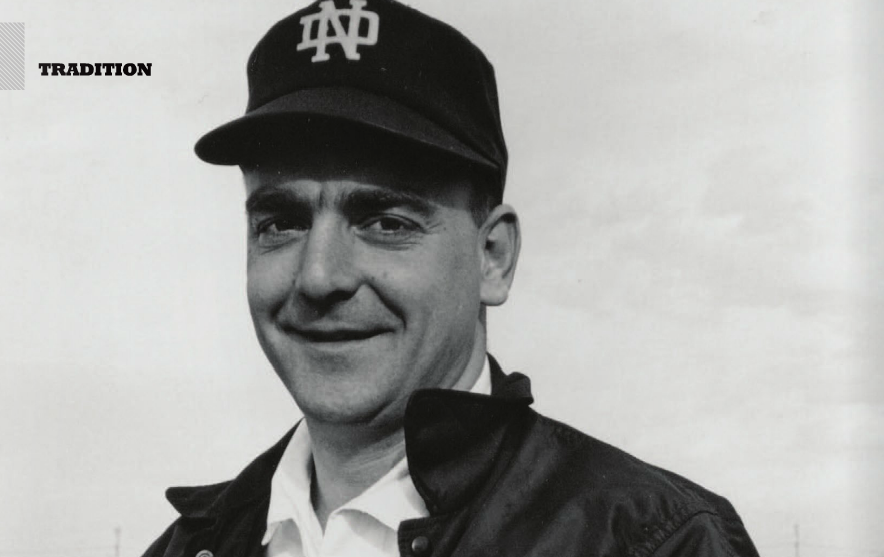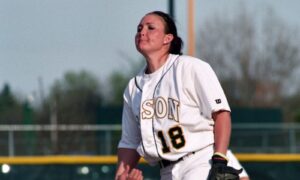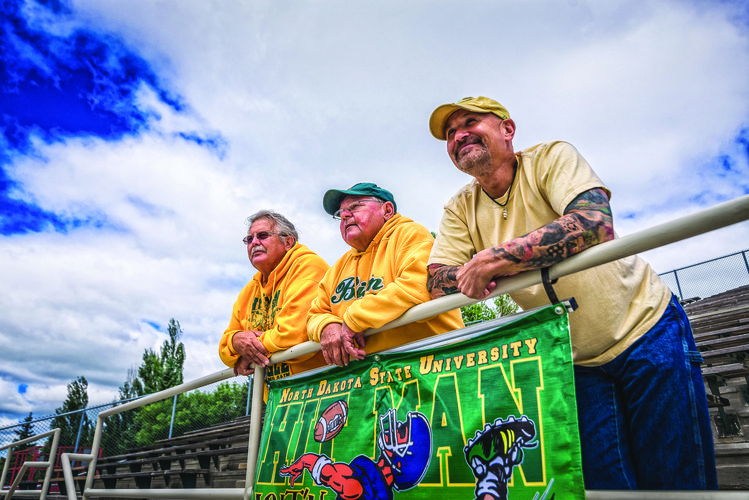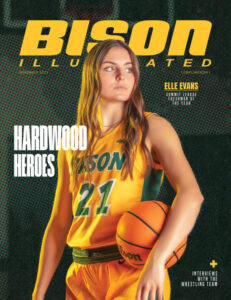By Steph Stanislao
“Bison Pride.” It can be seen everywhere in the Fargo-Moorhead area, around North Dakota and even stretches to places far from the plains. For most of us, it is hard to define exactly what Bison Pride is, but for Dr. Denis Isrow, the man who coined the term, it is simple. Izzy has been with NDSU Athletics for 49 years, and is known as the “Father of Athletic Training” in North Dakota.
Dr. Isrow’s dream wasn’t always to become an expert in his field of athletic training or even to care for injuries, but sometimes dreams come to an individual at the most unexpected moment. Isrow, also known as Izzy, did not attend college immediately after graduating in 1955 from his high school in Michigan, but instead chose to serve his country as a Marine. Upon returning from his time in the service, Isrow attended Adam’s State College in Colorado. “I got back from the Marine Corp and went out for spring ball, and you have to remember I’m a 25-year-old man and they’re all 18-year-olds, so I went out for football and it was the first time I met [Coach] Darrel Mudra,” Isrow said. As an older man, than the rest of his teammates, Isrow was uncertain if he would see playing time at all. After having a conversation with Coach Mudra, and learning that he was the number four center on the team, Isrow explained to Mudra his dedication to the team and said, “coach I love sports, I’ll do anything for the team that I can.” When fall rolled around football season began to heat up, and Isrow was on the sideline supporting his teammates. With any athletic activity there are bound to be injuries, and somehow Izzy was the guy that his team looked to if any of them got hurt. “We had two guys get injured and I took care of both of them, one was our quarterback and he ripped one of his intercostal muscles in his ribs. So, he had a really bad bruise. When I was in high school, I fell through a skylight and cut my ligament and tendon, and so my coach made a padding for me. I never forgot that. So I took a thigh pad, and bent it. I took it so that I could make it fit over his rib, and I took a piece of sponge rubber and cut a hole in it called a donut,” said Isrow. Continuing to work on his rib injury the next day or so, Izzy was able to have the quarterback ready for game day, and the team ended up winning the game. This one instance would forever change the path that Izzy’s life would take.
After saving the quarterback from, what the training staff at the time thought was, a season-ending injury, Isrow began taping his teammate’s ankles in secret. “I would be taping these guys in a dummy shed, because I’m not supposed to be doing these things. The trainer was really a picky son-of-a-gun. He was too old! It took him 20 minutes to tape an ankle, and I could do 15 ankles in that time. So I was taping these guys. Mudra said, ‘How are you guys getting off to practice so quickly?’ They said, ’Izzy’s taping us.’ So he kept hearing Izzy, Izzy, Izzy.”
Eventually Coach Mudra decided it was time to move on to the next step in his coaching career and took a football coaching job at North Dakota State. “I’m walking across campus, and Mudra walks over and goes, ‘What are you going to do next year? And I said, ‘well coach I applied for five coaching jobs.’ I thought I was going to be a football coach. That’s what I wanted to be. He said, ‘Would you ever consider finishing your masters?’ I said, ‘Coach I owe so much money to my dad. I don’t know if I can do this. I have to pay bills back.’ He said, ‘I’ll give you two scholarships. I’ll make sure you’ve got enough money to live on.’ I said, ‘Well I’ve got to ask before I can do it.‘” After convincing his father that getting his masters was a good idea, as it would give him more opportunities to obtain a better job and thus make more money, Isrow told Mudra that his answer was yes. I said to Mudra, ‘Where are we going?’ He said, ‘North Dakota State.’ I said, ‘where’s North Dakota State?’ He said, ‘In Fargo.’ I said, ‘Where the hell is Fargo?’ Now this is like the 16th of August. I’m graduating that Friday. That Monday I have to be on the field taping the athletes. I don’t even know where Fargo is! I don’t know where North Dakota is! So I came in and I was so angry I told him every day I was going to quit! I would say, ’I’m quittin’ I’m going to serve beer in my dad’s bar! I’m gettin’ the hell out of here!’ He’d say, ‘Sit down! We’re gonna be another Michigan State!’ He just pounded me, and I really liked him. I probably respect him more than any other coach I’ve ever had. If it wasn’t for him, none of us guys would have ever been here.”
Originally when offered the job at NDSU, Isrow was told that he would be coaching centers, as well as caring for any injuries. It didn’t take long for Izzy and Mudra to figure out that it wasn’t going to work. “Mudra got me a whirlpool and I started doing my treatments. The players kept calling me Oral Roberts. I put them in ice and I’d tape them, I’m really an Oral Roberts,” Isrow said with a chuckle. Although the players were impressed by the amount of care and treatment that they were receiving from Izzy, there was still some convincing to do. “You’ve got to remember that we’re trying to prove to these football players that this training system is what we need and what we want. We go to play Idaho State, and we’re in practice…we don’t wear face masks or mouth guards, so Steve Irgens, our defensive end, gets nailed in the nose. I was going to set it and he said, ‘No! You’re not touching me!’ So I said, ‘Fine and dandy!’ In those days we didn’t have a physician or any connection, but there was a woman medical doctor on Broadway, so I took him to her. ‘She said, ’Oh yeah that’s not broken, that’s dislocated.’ I just had to laugh. She said, ‘You just sit and relax,’ and moved his nose back into place. His eyes got real big and you could tell he was in pain. We’re walking back to the car and he said, ‘I don’t give a shit if I break my arm, you’re my doctor!’ He told all the players, ‘If anything happens you make sure Izzy fixes you!’”
Isrow is not only important to NDSU Athletics for his talent and dedication as an athletic trainer, but also as a motivator and role model for student athletes and other staff. The mentality that Isrow has about hard work, loyalty and tradition is one of the most admired things about him. “The Marine’s are always faithful. What that means is that if you’re in a combat situation fighting and somebody gets shot you either have to take him with you, or you have to stay there and die with him. You can’t leave. And that’s the same thing I tried to get the players to understand. You put on the green and gold? You have to pay the price. You’re not going to quit. You’re not going to give up ever.” A speech by Isrow could get anybody fired up, it doesn’t matter what the situation might be. This man has a way with words. “In the Omaha game, which goes back a few years ago, Omaha was undefeated, and we had two losses already. I gave a speech, but that’s not the important part. The important part is they got the information from me that if you got hurt you got off the field. You don’t lay on the ground and tell me that you’re hurt bad, because if you’re really really hurt then you lay there, because our training staff is the best in the country… and that’s a proven fact. And when Lamar Gordon went down that time, he took a shot. When that guy hit him he went back and smacked his head on the ground. He rolled over, got on all fours and I watched him try to get up, and you can tell he’d been hit hard. He got up, because he wouldn’t lay there and came off the field. I think he waited two plays and went back in. He was hurt and took a hell of a shot again, so we pulled him out of the game. But he had fired all the rest of the players up, ‘Hey if he’s gonna not lay down, then I’m not gonna.’ I made a statement to the team and said, ‘When it comes to the fourth quarter and we do this, Omaha will have their heads down and walk off the field.’ I said, ‘We’ll have our heads up and we’ll run off the field.’ And that’s exactly what happened.”
Dr. Isrow has been an inspiration to athletes and students on and off the field. Always willing to listen and lend a hand, Izzy made long-standing connections with numerous individuals and has changed many lives. Isrow would help players with everything from helping them get furniture to giving meaningful advice. As a loved and trusted mentor for so many of the athletes and students that have come through NDSU, Izzy has received many tokens of appreciation. “We had gotten beat in ‘66 and we were coming back on the bus, and all of a sudden two of the captains said, ‘would you come to the back of the bus?’ I said, ‘Yeah.’ So I came back and they said, ‘We know you aren’t going to get a trophy this year and we know you ain’t gonna get a ring. But, we feel that you’ve done more for us on and off the field.’ It’s a little box, it says first aid on it, and it holds band-aids in it. It is gold. They said, ‘We just want you to know that this is how much you mean to us.’ Now you can’t evaluate that. Sometimes my kids would say, ‘I only took one band-aid.’ I would say, ‘If you take a band-aid again, I’m gonna ring your neck,’ Isrow said laughing. “They don’t understand,” he said.
When he wasn’t treating player’s injuries, inspiring athletes to earn greatness or helping students off the field, Izzy was busy building the foundation for many of the most well known and important traditions that NDSU has today. This is the man who started Bison Pride. “I have to look at it just like the Marine Corp. Marine Corp pride is loyalty. That’s what I tell you…always faithful. You have to do what is required of you. You have to play the game and don’t worry about the other guy, because once you start you’re in trouble. If you listen to anyone on TV they always say it. If you start worrying about the other guys then we’re all in trouble. You’ve got to pay and do what you’re supposed to do. You’ve got to be loyal to what you’re doing. That’s what it’s all about. You’ve got to come to practice. You’ve got to do your thing. You can’t be late. That’s all part of it. It’s not one little word. It’s not one little thing. The things that are important, as a statement, are ‘Once a Bison, Always a Bison.’ Tradition. We don’t have to talk about tradition. We know what it is. Maybe somebody can’t explain it, but it has meaning to it. It’s part of your life.”
Athletic Director, Gene Taylor on Izzy
“Well you know, he was over in the HNES Department when I came here. He was the head of the athletic training side of things. But, what I feel that he has done the most is he allowed us to be connected to some of the earlier guys involved with NDSU. The guys from the ’60’s. He’s really been a champion of keeping those guys and staying in touch with them, and getting them to stay connected with the athletic program. Some of them had begun to step away, some of them had felt that they were kind of forgotten a little bit, and Izzy did a great job of reconnecting us with them.”
“You could almost call him the father of the athletic training program, which he is. I think that Scott [Woken] would probably echo that. I think our program is one of the best in the country. Izzy built that thing from the ground up and takes a lot of pride in it, as does Scott.”
“Certainly that impact on our university has been huge.”
Director of Sports Medicine, Scott Wokken on Izzy.
“You know for us, and specifically for athletic training, not only athletics, he was pretty much the first athletic trainer in the state of North Dakota. He’s kind of considered the father of athletic training in the state of North Dakota. Starting here at NDSU in 1963, he was here for a long time. So pretty much everything that I’ve learned and that we teach the other trainers always goes back to Izzy. Certain rules, certain procedures, certain policies still to this day are a direct result of what we’ve learned from him. So that’s long standing when you think about it. He instilled in us, not only pride in athletics, but pride in athletic training. He was very very diligent and adamant that we act that way. Meaning that you take pride in what you’re doing, and when you take pride in what you’re doing, not only on the field but off the field, in our profession, but also in athletics. That was a daily thing for Izzy. You didn’t stray from that… you had no options. That’s just the way he was. That’s the way he taught us. To this day, certain things that happen in the training room, we call “Izzy-isoms” meaning as a direct result of what he taught us, or how he instilled it in us.”








